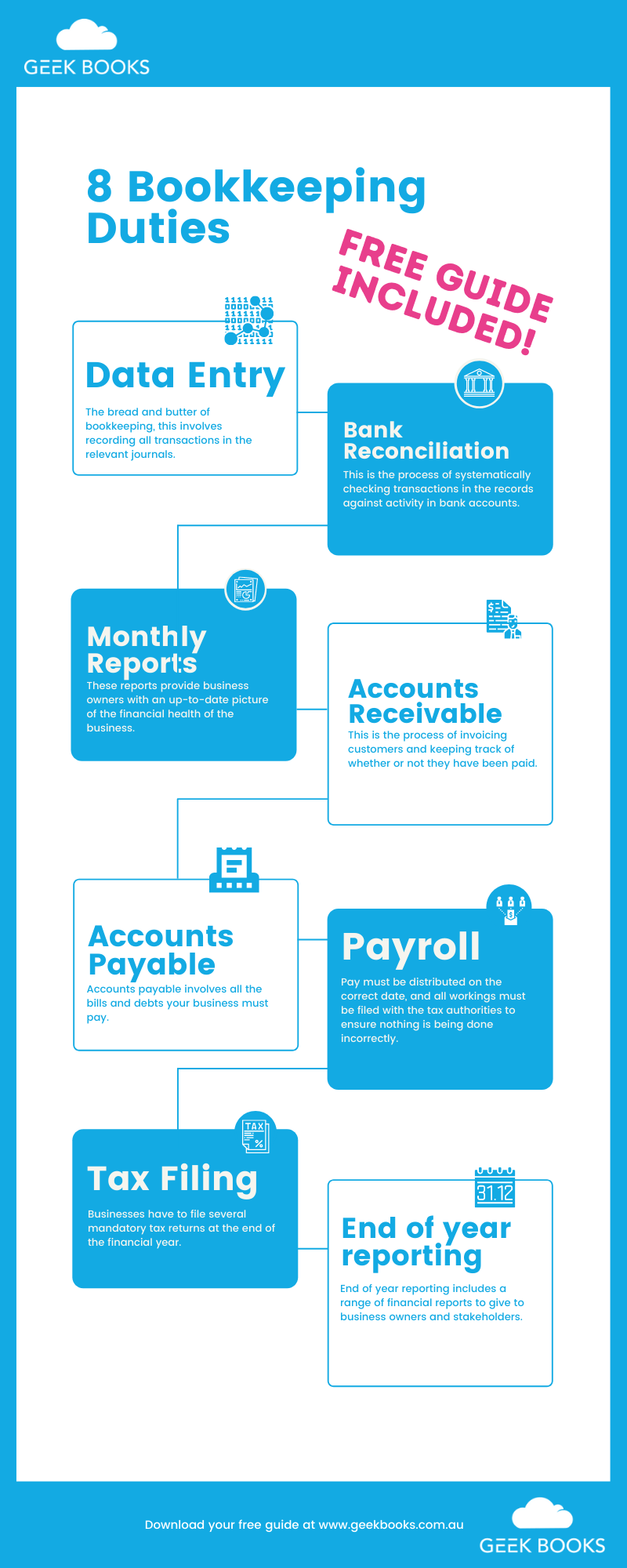The main thing to think about when considering bookkeeper duties is the creation and maintaining of a formal record of company income and spending.
This enables a company to provide an accurate trail of all transactions when it comes to filing accounts.
In other words, bookkeepers have a finger on the pulse of the business.
Their work requires a talent for being organised, as the information they record must be consistently accurate and up-to-date. Sometimes, the work of bookkeepers overlaps with that of accountants, and they can be involved in producing reports and developing strategies.
In this article, we will look at 8 key bookkeeper duties as they work with a company. It might be helpful to first familiarise yourself with these common bookkeeping terms.
What are the Duties and Responsibilities of a Bookkeeper?
The two fundamental tasks of a bookkeeper in a small business are data entry and bank reconciliation.
These processes are required for all other bookkeeping and accounting tasks, which can include:
-
- Monthly reports
- Accounts receivable and accounts payable
- Payroll
And more
Though many of the bookkeeper daily duties could be carried out by a business leader or employee with a flair for numbers, there are benefits to hiring a professional bookkeeper.
For a start, bookkeeping processes can be very time-consuming and tedious for anyone in your business whose focus would be better placed elsewhere.
What’s more, a dedicated bookkeeper will be entirely focused on the task at hand, reducing the risk of errors and/or missed deadlines.
If you want to learn more about how a professional bookkeeper can benefit your business, contact GeekBooks today. You can also find more on the question of how much does a bookkeeper cost here.

What are the skills of a bookkeeper?
Aside from a natural aptitude for numbers, there are several key skills that make a good bookkeeper.
These include:
- The ability to be accurate while working quickly
- An ability to remain focused
- Excellent attention to detail
- Comfortable working to strict deadlines
- Computer skills, particularly databases and financial software
- Honesty, discretion and reliability
A bookkeeper who ticks all these boxes is likely to be a good prospect for successfully maintaining the financial records for your business.
Knowledge of what is double entry bookkeeping is also essential.
What is the main function of bookkeeping?
Bookkeeping involves the consistent and accurate recording of daily transactions.
This is crucial for collating the financial data necessary to run a business successfully.
What is bookkeeping, and what does it include?
Bookkeeping functions include:
- Maintaining the general ledger
- Recording business transactions in journals
- Posting debits and credits
- Creating invoices
- Preparing certain financial statements
- Completing payroll
Supporting documents are required for many business transactions.
These include things like receipts and invoices.
What are the different types of bookkeeping?
As with many professions, bookkeeping comes in various forms – it depends on the needs of the business.
Here are some of the bookkeeping types that keep a modern business ticking over:
- Sole traders: these are individuals working as bookkeepers on a freelance basis. They will usually have some training and certification to show, and they take on clients remotely to handle the bookkeeping tasks required.
- In-house bookkeepers: these are employees of a business who handle the bookkeeper duties. They may be professional bookkeepers who maintain the books as their sole function, or they might be the person nominated by the business to handle the bookkeeper assistant duties on top of their other responsibilities.
- Bookkeeping firms: similar to accounting firms, these are teams of bookkeeping selling off-the-shelf packages that range from basic bookkeeping through to more advanced things like strategic advice. Their services usually include all the bookkeeper duties small business owners will need. You can learn more about bookkeepers vs accountants.
8 Bookkeeping Duties
Different businesses have different needs from a bookkeeper.
It depends on things like business size and industry, and GeekBooks offers a range of services for clients in various industries.
If things like consistent data entry or bank reconciliation are difficult for you to keep up with, outsourcing these tasks could free up some time and headspace to focus on business.
If you are uncertain about whether all bookkeeping tasks are being handled correctly, this section covers the most important things.
GeekBooks can even provide training to help you implement the necessary systems if you are committed to handling bookkeeping in-house.
Whatever your thoughts about bookkeeping, here’s a bookkeeper duties list of the 8 most important processes you need to be aware of.
1. Data entry
The bread and butter of bookkeeping, this involves recording all transactions in the relevant journals.
They are then added to the general ledger (along with supporting documents where needed) for a comprehensive, accurate and up-to-date record of your company’s financial activity.
2. Bank reconciliation
Another core function of bookkeeping, this is the process of systematically checking transactions in the records against activity in bank accounts.
The aim is to ensure that company records and bank account data is a match, and identifying and resolving anomalies so that there are no problems when it comes to filing accounts at year-end.
3. Monthly reports
Monthly reports can include statements like:
- Balance sheets
- Profit and loss statements
- Cash flow
- Aged receivables and aged payables
These reports provide business owners with an up-to-date picture of the financial health of the business.
This can help with developing strategy and preparing for the annual reports at the end of the accounting period.
4. Accounts receivable (and credit control)
This is the process of invoicing customers and keeping track of whether or not they have been paid.
This includes chasing up overdue payments.
It’s important because, without it, the business could lose out on money it is owed and thus be less profitable.
5. Accounts payable
Accounts payable involves all the bills and debts your business must pay.
It’s essential to maintain a good relationship with suppliers, contractors and lenders, so you must keep track of what you owe and ensure payments are made promptly.
You also want to manage these payments to ensure they aren’t all owed at the same time because this could decimate your bank balance.
6. Payroll
This is about more than just paying staff. Employers are responsible for taking out deductibles like tax, and also managing entitlements to leave and other human resource concerns.
Pay must be distributed on the correct date, and all workings must be filed with the tax authorities to ensure nothing is being done incorrectly.
7. Tax filing
Businesses have to file several mandatory tax returns at the end of the financial year.
It can be difficult to get everything right and could lead to you paying too much or too little in tax.
Bookkeepers are often tasked with handling this, but it can also be the work of an accountant.
In either case, the processes of bookkeeping throughout the year are fundamental to submitting accurate information.
8. End of year reporting
Similar to the monthly reporting, end of year reporting includes a range of financial reports to give to business owners and stakeholders.
However, end of year reports are compiled from all the data for the financial year, offering analysis of performance over a longer period.
These reports can form the basis of a strategy for the coming year, so it is important they are accurate and insightful.

FREE Bookkeeper Duties Checklist
For small business owners that are committed to carrying out the bookkeeping themselves, it’s important to know what needs to be done.
Starting with a bookkeeping guide is essential to understanding all the tasks a bookkeeper has to do.
If you don’t keep up with all the tasks regularly, you can easily fall behind and find yourself with a mountain of work to get through.
With that in mind, we have created this simple bookkeeper checklist for you to download.
It covers the most important tasks you need to do daily, weekly, monthly, quarterly and annually.
If you keep up with everything listed in this resource, you should stay on top of your business finances and be fully prepared when you reach the end of the financial year.
Without further ado, here is the checklist we’ve compiled for you:
Daily tasks:
☐ Track all payments into and out of the business
☐ Check which bills are due to ensure timely payment
Weekly tasks:
☐ Undertake bank reconciliation to ensure your records of transactions are accurate
☐ Record all customer invoices, receipts and payments, as well as supplier bills and payments
☐ Create and send invoices
☐ Update payroll if you have gained or lost any employees
Monthly tasks:
☐ Reconcile your bank statement when it arrives, ensuring all transactions are as expected
☐ Check receivables for overdue payments from customers and follow up where necessary
☐ Ensure you have met your payroll obligations like tax and pension contributions
☐ Check profits and losses and compare to previous months to assess business performance and progress towards goals
☐ Review your balance sheet and check you are up-to-date with all outstanding debts and obligations
☐ Log and pay your BAS and super obligations (if due monthly)
Quarterly tasks:
☐ Create an overview of projected budgets and cashflow
☐ Log and pay your BAS and super obligations (if due quarterly)
☐ Look over your aged receivables and consider referring to debt collections
Annual tasks:
☐ Complete and file your tax returns and accounts
☐ Review your annual accounts and assess how they measure up to your goals at the start of the financial year
☐ Produce annual reports to help create strategies for the coming year
You can find other bookkeeping templates here.
Summary
As you can see, the duties of a bookkeeper are actually quite diverse, and they can crossover into the territory of accounting.
It depends on the needs of the business and the capabilities of the bookkeeper in question.
The tips and resources provided in this article should help you if you are doing your own bookkeeping.
It’s important to be aware of all your obligations and keep up with them consistently to avoid falling behind.
You should also now be more aware of the duties you would require of a bookkeeper if you decide to outsource to a firm like GeekBooks.
Our extensive packages and menu of services cover everything an SME will need to keep on top of their finances and operate successfully.
Whether you need a single service or a complete virtual accounting solution, you’re in good hands with GeekBooks.
Contact us today for a free, no-obligation chat about your business and how we could help.
The success of your business is important to us, so we always offer affordable rates for our service and work with businesses all around Australia.
We look forward to hearing from you!
If you’re keen on handling bookkeeping yourself be sure to checkout our bookkeeping for beginners guide and these helpful bookkeeping tips.



